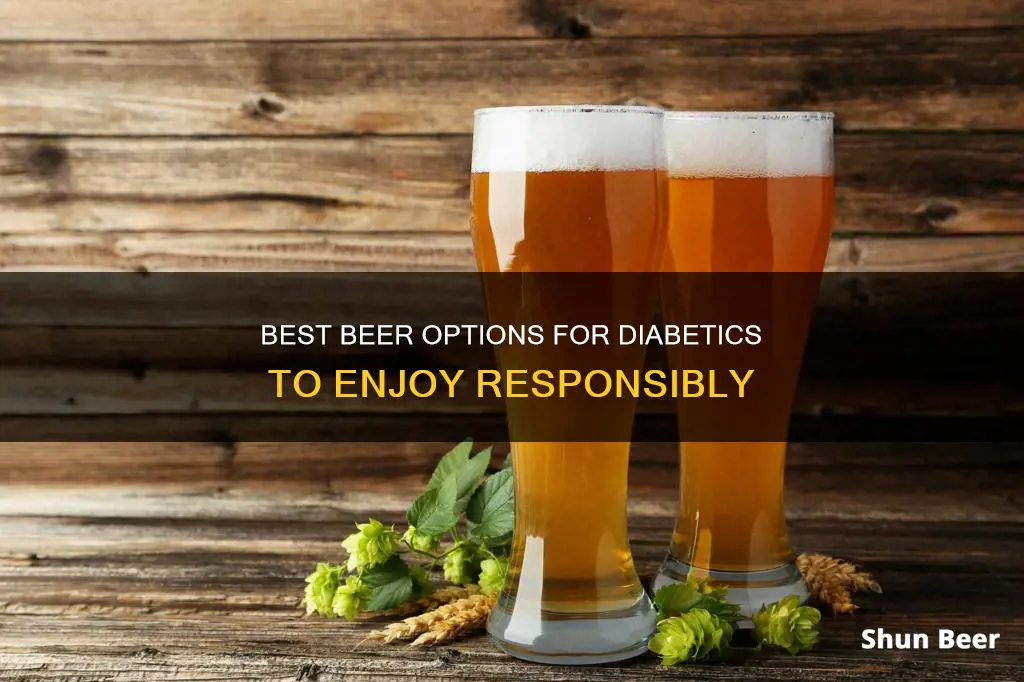
If you have diabetes, you may be wondering if you can still enjoy a beer. The answer is yes, but it's important to know how to do so safely. Beer is a significant source of carbohydrates, so it can impact blood sugar levels. It can also be high in calories, contributing to weight gain, and some types of beer can be higher in alcohol. Here are some tips to help you enjoy a beer safely if you have diabetes.
| Characteristics | Values |
|---|---|
| Carbohydrates | 13 grams |
| Vitamins & Minerals | B vitamins, calcium, magnesium, phosphorus |
| Alcohol Content | 5% |
| Volume | 12 ounces |
| Safe Consumption for Women | 1 drink per day |
| Safe Consumption for Men | 2 drinks per day |
| Hypoglycemia Risk | Low blood sugar, dizziness, loss of consciousness |
| Safe Consumption for Diabetics | In moderation, with food, and regular blood sugar checks |
| Recommended Beer Types | Light beers, dry wines, seltzers |
What You'll Learn

Diabetics can drink beer in moderation
Diabetes does not mean you have to give up beer entirely. However, it is essential to understand how to drink safely to maintain healthy blood sugar levels and avoid complications. Here are some insights and guidelines for drinking beer if you have diabetes:
Impact of Beer on Blood Sugar
Beer can impact your blood sugar levels. It is a significant source of carbohydrates, and depending on the type, it may also be high in calories and alcohol content. The liver, which is responsible for releasing glucose into the bloodstream, prioritises breaking down alcohol when you drink. This process can delay the release of glucose, potentially leading to low blood sugar or hypoglycaemia. Therefore, drinking in moderation and monitoring your blood sugar levels are crucial.
Guidelines for Safe Drinking with Diabetes
To drink beer safely with diabetes, follow these recommendations:
- Drink in moderation: Limit your intake to one drink per day for women and up to two drinks per day for men, according to the Dietary Guidelines for Americans. One drink is typically defined as 12 fluid ounces of regular beer (5% alcohol).
- Drink with food: Avoid drinking on an empty stomach. Consume beer with a meal or a carbohydrate-rich snack to maintain stable blood sugar levels.
- Monitor blood sugar: Check your blood glucose levels before, during, and after drinking, as well as up to 24 hours after drinking.
- Be mindful of symptoms: The symptoms of low blood sugar, such as dizziness, confusion, and drowsiness, can be similar to those of alcohol intoxication. Be aware of these signs and inform those around you to recognise and address any issues.
- Choose lower-carb options: Opt for "light" beers, which have fewer carbs, calories, and alcohol content. This is especially important if you plan to have more than one drink.
- Pace yourself: Stick to the rule of no more than one drink per hour and no more than three drinks for women or four drinks for men in a day.
- Stay hydrated: Drink plenty of water along with your beer to maintain hydration.
- Discuss with your doctor: Consult your healthcare provider to understand how alcohol may affect you and to ensure it is safe for you to drink.
Beer Alternatives for Diabetics
If you are looking for alternatives to beer, there are several diabetic-friendly alcoholic beverage options:
- Low-carb beers: Opt for beers with lower carbohydrate content, such as Miller Lite, Coors Light, Bud Light, or Busch beers.
- Red and white wine: Wines, especially dry varieties, have lower sugar and carb content than sweet wines.
- Distilled spirits: Gin, rum, vodka, and whiskey contain zero grams of carbohydrates per serving.
- Low-carb cocktails: Choose cocktails that use low-sugar mixers, such as a vodka soda or a dry martini.
Remember, drinking beer or any alcoholic beverage as a diabetic requires careful consideration and moderation. Always consult your healthcare provider for personalised advice and guidelines.
Paper Cup Beer: Is It Possible?
You may want to see also

Beer is high in carbs
Beer is a staple beverage for many, but it is important to be aware of its nutritional content, especially if you have specific dietary requirements, such as those with diabetes. Beer is a significant source of carbohydrates, with an average 12-ounce can containing 13 grams of carbohydrates. This is nearly one carb serving, which can significantly impact blood sugar levels.
The carbohydrate content of beer can vary depending on the type and brand. Regular lagers typically contain 10-15 grams of carbohydrates per pint, while some light beers may have less than 10 grams per pint, and certain brands offer options with less than 5 grams. Stouts, Porters, and Guinness tend to be on the higher end, with upwards of 20 grams of carbohydrates per pint. Real ales usually contain 10 to 20 grams of carbs per pint, but this can vary depending on additional flavourings.
Beer is not the only alcoholic beverage with carbohydrates. Mixed drinks, for example, are also typically high in carbs due to added ingredients like sugar and juice. However, beer's carb content is particularly notable as starch is one of its primary ingredients. This makes it a significant source of carbs in the diet, which can be concerning for those with diabetes or following a low-carb diet.
The impact of beer's carb content is twofold. Firstly, it can affect blood sugar levels, which is a critical concern for people with diabetes. Secondly, the calories from these carbs are considered empty calories, as they provide energy but little to no essential nutrients like protein, fibre, vitamins, or minerals. This can potentially contribute to nutritional deficiencies and lead to weight gain over time, especially when consumed in excess.
Therefore, for those mindful of their carbohydrate intake, it is essential to consider the carb content of beer and opt for lower-carb options if needed. Additionally, drinking in moderation and pairing beer with food can help mitigate some of the potential negative effects of the beverage's carb content.
Pizza Hut's Beer Delivery: How Does It Work?
You may want to see also

Alcohol affects blood sugar levels
Alcohol can affect blood sugar levels in people with diabetes, causing them to fluctuate. When you drink alcohol, your liver is busy breaking it down, which means it stops releasing glucose. This can cause your blood sugar level to drop, resulting in hypoglycemia. The risk of hypoglycemia is higher if you drink on an empty stomach, and it can last for hours after your last drink. The more you drink, the higher the risk.
Drinking alcohol can also affect your diabetes medication. Alcohol can interfere with the effects of some diabetes medications, increasing the risk of hypoglycemia or hyperglycemia, depending on how much you drink and what medication you take. Alcohol also has a lot of calories, which can lead to weight gain and make it harder to manage diabetes. Calories from alcohol are stored in the liver as fat, and liver fat makes liver cells more insulin resistant, which can make your blood sugar levels higher over time.
Symptoms of low blood sugar can be similar to those of alcohol intoxication, including dizziness, loss of consciousness, slurred speech, drowsiness, confusion, and difficulty walking. This can make it difficult for you or those around you to distinguish between the two conditions.
If you choose to drink alcohol, it is important to do so in moderation and to take certain precautions. It is recommended that women have no more than one drink per day and men no more than two drinks per day. It is also important to drink alcohol with food, preferably a carbohydrate-rich snack or meal, to help maintain normal blood sugar levels. Drinking slowly and mixing liquor with water, club soda, or diet soda can also help. It is also crucial to carry a source of sugar, such as glucose tablets, in case of low blood sugar.
It is always a good idea to talk to your doctor about your drinking habits and how they may affect your diabetes management. They can provide personalized advice and guidelines based on your specific health concerns.
How to Respond When Your Dog Drinks Beer
You may want to see also

Alcohol may reduce medication effectiveness
Drinking alcohol can affect how well your diabetes medication works. Alcohol can interfere with the effectiveness of some oral diabetes medications and insulin. This is because the liver has to work to remove the alcohol from the blood instead of managing blood sugar levels. The liver is the organ that stores and releases glucose (sugar) into your bloodstream. It does this between meals and while you sleep to help maintain healthy blood sugar levels. When you drink alcohol, the liver has a difficult time doing both jobs at the same time. It ends up breaking down alcohol instead of releasing glucose regularly. This can lead to low blood sugar, known as hypoglycemia.
The liver takes about 1 to 1.5 hours to process each alcoholic drink, and during that time, you may be at risk of low blood sugar. The risk multiplies with each additional drink you have. The risk can be lowered if you take alcohol along with food. If you've had alcohol close to bedtime, you should test your glucose level; if it’s low, consume a carbohydrate-rich snack before bed.
Some diabetes medications, such as sulfonylureas and thiazolidinediones, can increase your risk of hypoglycemia (low blood sugar). Excessive consumption of alcohol further affects that risk. If you’re taking medication, talk with your doctor about whether and how you can safely drink alcohol.
Over time, excessive alcohol consumption can reduce the overall effectiveness of insulin. This results in high blood sugar levels. Many people with alcoholic liver disease also have either glucose intolerance or diabetes.
Alcohol consumption can also lead to situational unawareness of low blood sugar levels. Some of the symptoms of low blood sugar levels are similar to those of consuming too much alcohol. These include:
- Lightheadedness or dizziness
- Lack of coordination
- Flushing
- Nausea
- Increased heart rate
- Slurred speech
Beer and Breastfeeding: Is It Safe to Drink Alcohol?
You may want to see also

Low-carb beers are a better option
Beer is a staple beverage for many, but for people with diabetes, it can be a tricky choice. While it is not entirely off-limits, it is important to understand the impact of beer on blood sugar levels and how to make informed decisions when opting for an alcoholic beverage.
Beer is a significant source of carbohydrates, and depending on the type, it can also be high in calories and alcohol content. A standard 12-ounce can of beer typically contain 13 grams of carbohydrates. This can significantly affect blood sugar levels, especially for those living with diabetes. The impact of beer on blood sugar is twofold: firstly, the liver, which is responsible for releasing glucose into the bloodstream, prioritises breaking down alcohol instead, leading to potential hypoglycemia or low blood sugar. Secondly, beer's carbohydrate content can cause a spike in blood sugar levels, especially for those with diabetes who need to carefully manage their glucose intake.
So, what is a diabetic beer lover to do? The answer lies in opting for low-carb beers. These beers have fewer calories and carbohydrates compared to regular beers, making them a better choice for people with diabetes. For example, a standard 12-ounce can of Miller Lite contains only 3.2 grams of carbohydrates, while a regular Miller beer has 12 grams. Similarly, Coors Light provides 5 grams of carbs per bottle, compared to almost 12 grams in standard Coors Banquet. Bud Light is another excellent option, with fewer than 5 grams of carbs per serving, which is significantly less than the 10.6 grams found in a regular Budweiser.
When choosing a beer, it is essential to remember that "light" beers typically have the lowest carb content, usually five grams or less per serving. They are also lower in alcohol content, making them a safer choice for people with diabetes. Craft beers like IPAs and stouts, on the other hand, tend to be much higher in carbs, often containing 15 grams or more per serving. They also tend to be higher in calories and alcohol content, so it is best to stick to just one serving if you choose to indulge.
By selecting low-carb beers, people with diabetes can still enjoy an occasional beer without compromising their blood sugar management. It is crucial, however, to always drink in moderation and to pair alcoholic beverages with food to minimise the risk of hypoglycemia. Additionally, staying hydrated by drinking water alongside beer is essential.
In conclusion, while beer may be a beloved beverage, it is important for people with diabetes to approach it with caution. Low-carb beers offer a safer alternative, allowing individuals with diabetes to make more informed choices and better manage their blood sugar levels while still enjoying an occasional drink.
Drinking Beer While Taking Lexapro: What You Need to Know
You may want to see also
Frequently asked questions
Yes, people with diabetes can drink beer, but it's important to do so in moderation and to be aware of how it can affect blood sugar levels.
Light beers tend to be lower in carbohydrates, calories, and alcohol content, so they are a better option for people with diabetes.
Beer can cause blood sugar levels to drop, as the liver prioritizes breaking down alcohol over releasing glucose. This can lead to hypoglycemia, especially if drinking on an empty stomach.
It's recommended that women have no more than one drink per day, and men have no more than two drinks per day. One drink is typically considered to be 12 ounces of beer.
Some popular low-carb beer options include Miller Lite, Coors Light, Bud Light, and Busch beers.







